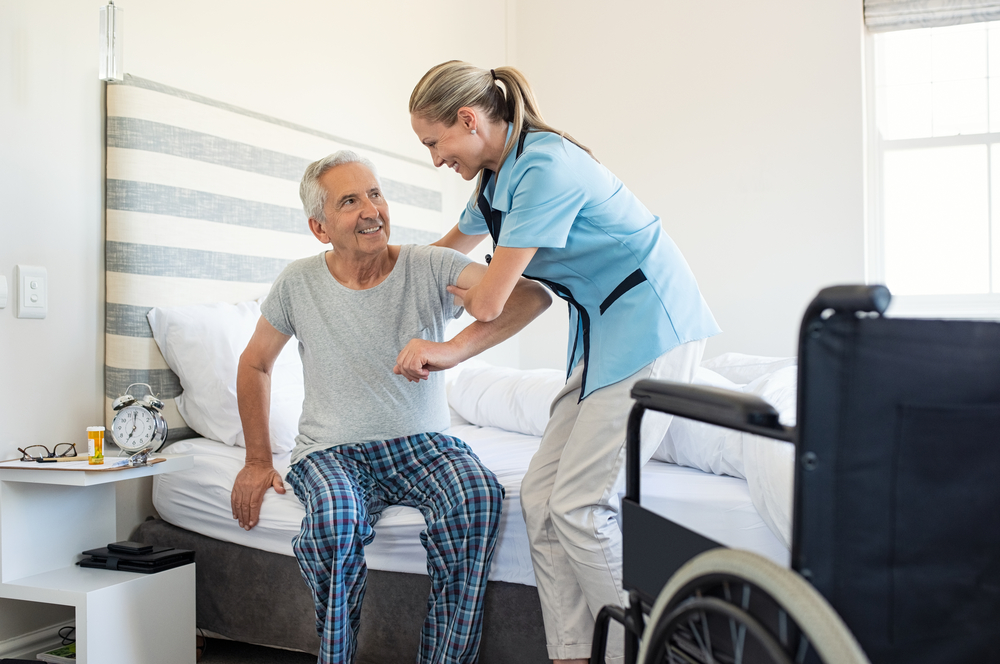Facing a terminal illness is a deeply personal experience. End-of-life care becomes a critical consideration, ensuring comfort and dignity during this tender time. Many people now wish to spend their final days at home, surrounded by loved ones. In-home care can be the answer, offering a compassionate and supportive solution. By providing expert care in the comfort of your own home, in-home providers can significantly enhance comfort and dignity for terminally ill patients, while also supporting their families through this emotional journey.
Comfort and Dignity: Weaving a Tapestry of Meaningful Farewells
As we approach the final chapter of life’s journey, two crucial elements rise to the forefront: comfort and dignity. Comfort, in this context, transcends mere physical ease. It encompasses a holistic approach that minimizes physical and emotional distress, allowing the patient to experience a sense of peace and well-being in their final days.
Dignity, on the other hand, focuses on respecting the patient’s autonomy, choices, and individuality throughout this tender time. It’s about honoring their right to make decisions about their care, fostering a sense of self-worth and respect, even as physical limitations may increase (https://www.samaritannj.org/resources/).
Statistics paint a compelling picture of this desire for a dignified and comfortable farewell. A growing number of people, upwards of 75% according to a study by the National Hospice and Palliative Care Organization (https://www.nhpco.org/wp-content/uploads/Medical_Aid_Dying_Position_Statement_July-2021.pdf)), express a deep-seated yearning to spend their final days at home. This desire often stems from a profound human need for peace, privacy, and a sense of control over their final moments.
Home transcends the concept of mere bricks and mortar; it becomes a sanctuary, a familiar space imbued with cherished memories. Surrounded by the comfort of loved ones and the objects that hold personal significance, patients can find a sense of belonging and continuity. This familiar environment allows them to face the inevitable with a sense of peace, making the final farewell more meaningful and less daunting.
Here’s a breakdown of the various facets that contribute to a dignified and comfortable end-of-life experience at home:
- Pain and Symptom Management: Effective pain management is a cornerstone of comfort. In-home care providers work closely with doctors to ensure patients receive appropriate medication and utilize other techniques to minimize physical discomfort. This allows them to focus on spending quality time with loved ones and find much-needed respite in their final days.
- Emotional and Spiritual Support: Beyond physical needs, the emotional and spiritual well-being of the patient is paramount. In-home caregivers can be a source of companionship, offering a listening ear for anxieties, fears, and unresolved issues. They can also facilitate connections with spiritual resources if desired, ensuring the patient feels supported on all levels.
- Respecting Individual Preferences: In the familiar confines of home, patients retain a sense of control over their environment and daily routines. In-home care fosters this autonomy by respecting their preferences and choices, allowing them to make decisions about their care with dignity. This can range from selecting preferred meals to choosing the time for personal care routines.
The Comforting Embrace of In-Home Care: A Multifaceted Approach
In-home care steps in as a gentle yet powerful force, weaving a tapestry of comfort around terminally ill patients in several key ways:
- Pain and Symptom Management: A Tailored Approach
Working hand-in-hand with the patient’s doctor, in-home providers become advocates for effective pain management. This goes beyond simply administering medication. Here’s a closer look:
Medication Management: Caregivers can administer prescribed pain medication according to the doctor’s orders, ensuring the patient receives the correct dosage at the right time. This can significantly reduce pain and discomfort.
Complementary Therapies: In-home providers can also offer or facilitate complementary therapies such as massage, aromatherapy, or music therapy, which have been shown to reduce pain and improve relaxation (https://www.ncbi.nlm.nih.gov/books/NBK572296/).
Positioning and Comfort Measures: Simple techniques like proper positioning in bed or using supportive pillows can significantly reduce pain and improve comfort. In-home caregivers are trained in these techniques and can help ensure the patient is as comfortable as possible.
- Physical Care and Daily Support: Maintaining Dignity and Independence
Beyond pain management, in-home care offers a helping hand with daily activities, empowering patients to maintain a sense of independence and control over their routines for as long as possible. This includes:
Activities of Daily Living (ADLs): Caregivers can assist with bathing, dressing, toileting, and other essential daily tasks. The level of assistance can be tailored to the patient’s individual needs and preferences.
Mobility Assistance: For patients with mobility limitations, caregivers can provide support with walking, transferring from bed to chair, or using assistive devices. This can help maintain a sense of autonomy and prevent falls.
Meal Preparation and Assistance: In-home caregivers can help with grocery shopping, meal preparation, and ensuring the patient eats a healthy and balanced diet. They can also assist with feeding if needed.
- Emotional and Spiritual Solace: A Listening Ear and a Bridge to Resources
The emotional and spiritual well-being of a terminally ill patient is just as important as physical comfort. In-home caregivers go beyond providing physical assistance; they become companions, offering a listening ear for anxieties, fears, and unresolved issues. This emotional support can be invaluable for patients facing the end of life:
Active Listening and Validation: Caregivers can provide a safe space for patients to express their emotions without judgment. They can practice active listening skills, acknowledging feelings and validating the patient’s experience.
Connecting with Loved Ones: In-home caregivers can help facilitate communication with family and friends, ensuring the patient feels connected and supported by their loved ones.
Spiritual Support: If desired, caregivers can connect patients with spiritual resources such as chaplains or religious leaders, providing comfort and guidance during this tender time.
By providing a multifaceted approach to comfort, in-home care allows terminally ill patients to experience a sense of dignity, control, and emotional support throughout their final journey.
Dignity Preserved: The Power of In-Home Care
In-home care goes beyond comfort; it champions the patient’s dignity in several ways:
- Autonomy and Control: In the familiar confines of home, patients retain a sense of control over their environment and daily routines. In-home care fosters this autonomy by respecting their preferences and choices, allowing them to make decisions about their care with dignity.
- Personalized Care in Familiar Surroundings: Unlike a hospital setting, in-home care tailors treatment plans to individual needs and preferences. Surrounded by cherished belongings and familiar faces, patients retain a sense of self and dignity.
- Supporting Family Caregivers: End-of-life care can be emotionally taxing for families. In-home care acts as a crucial support system, offering respite and assistance with daily tasks. This allows families to spend quality time with their loved one, focusing on shared moments and emotional connection, without the burden of constant care.
A Gentle Farewell: The Conclusion
As we approach the end, in-home care offers a powerful bridge between comfort, dignity, and expert medical support. By bringing compassionate care directly to you, in-home providers can significantly enhance the well-being of terminally ill patients, allowing them to spend their final days surrounded by loved ones in the cherished comfort of their own home. This not only eases the physical and emotional burden on the patient but also empowers families to focus on creating lasting memories during this precious time.
Mobile Physician Associates (MPA) understands the significance of a dignified and comfortable farewell. We offer a complete spectrum of in-home care services, tailored to meet the individual needs of terminally ill patients and their families. Contact MPA today for a consultation and explore how we can help your loved one experience a peaceful and dignified ending, surrounded by the warmth of home and the love of family.



